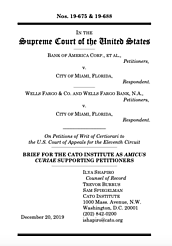Learn more about Cato’s Amicus Briefs Program.
The city of Miami has come up with an ingenious scheme: raise revenue without taxation by suing consumer banks for racial discrimination under the Fair Housing Act (FHA). The claim is that the banks’ allegedly discriminatory and predatory lending practices led to thousands of residential foreclosures and therefore millions in lost tax revenues to the city. And Miami isn’t alone in this plan. So far, more than a dozen other towns, cities, and counties have followed its lead.
The Supreme Court first heard this case in 2016. In a split opinion, the Court held that Miami had standing to sue because it was in the “zone of interests” the FHA was designed to protect. The Court sent the case back to Eleventh Circuit to re-examine proximate causation. “Proximate cause” is legal jargon for a moral limit on causation. Your refrigerator might break one morning, causing you to get into an accident while rushing to get to work. Proximate cause prevents you from suing the refrigerator manufacturer even though you wouldn’t have got in an accident otherwise. In this case, the Eleventh Circuit held that the injury had to be a “foreseeable” result of the harm, which strayed too far from the common-law tradition that informs statutory, tort-based liability.
The second time the Eleventh Circuit heard the case it again used a proximate cause formula that is far off target. Instead of relying on “foreseeability” alone, the Eleventh Circuit concocted a new standard also requiring some “logical bond” or “meaningful and logical continuity” between an FHA violation and a claimed injury. The new standard is almost nonsensical. In some sense, everything shares some “logical bond.” And what is a “meaningful continuity”?
Bank of America and Wells Fargo are again petitioning the Supreme Court to hear the case. Cato has filed an amicus brief in support arguing that the Eleventh Circuit’s misapplied the Supreme Court’s “guiding principles” of proximate cause, which include elements of foreseeability (a moral choice), continuity (the objective element), and directness (the essentially economic choice of how far to extend liability).
Miami’s claimed injuries might be an indirect result of the banks’ alleged FHA violations, but, historically, courts restrict the scope of liability to the first step in any causal chain—that is, to cover only direct harms. Power companies also lost customers due to foreclosures, but that doesn’t mean they can sue under the FHA even though that is an entirely foreseeable result. Similarly, banks shouldn’t be on the hook for the attenuated consequences of alleged FHA violations.
If the Supreme Court sustains the Eleventh Circuit’s decision, there will be national and even international consequences. If the Court doesn’t rein in the Eleventh Circuit, banks with millions of customers at home and abroad could be forced to foot the bill for losses “exceedingly attenuated” to their alleged FHA violations. Cato urges the Court to cabin FHA’s proximate cause standard within the tried-and-true confines of common-law precedents.

This work is licensed under a Creative Commons Attribution-NonCommercial-ShareAlike 4.0 International License.


